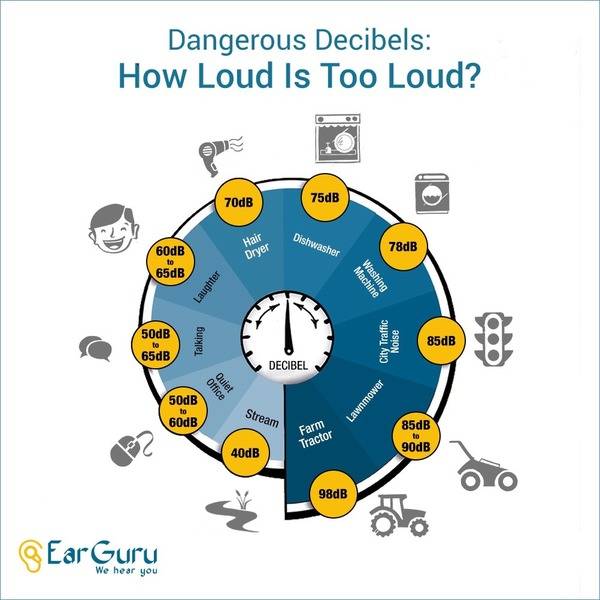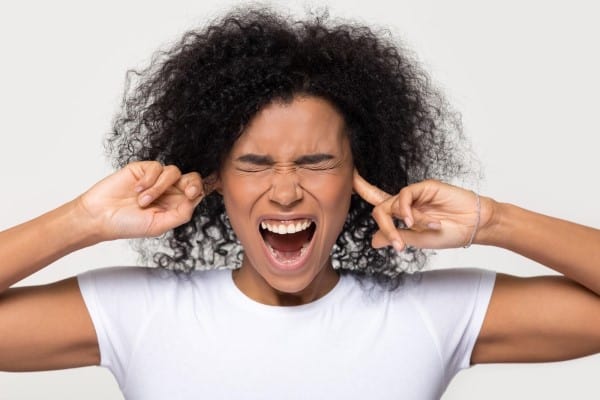The health of your hearing and preventing hearing loss often depends on how much you protect your hearing from the noisy environment. The problem is that it’s not always possible to know when you will be exposed to too much background noise. If you don’t know when something is too loud you can’t do anything appropriate to protect your hearing.
Prolonged exposure to noisy environment is one of the biggest cause of hearing loss, so being proactive about your ear health and keeping your hearing safe is important. There are some things you can do to protect your hearing, like leaving a noisy environment as soon as possible or you can mentally keep simple daily sound levels in mind as a way to gauge the existing noise level.
It’s understandable that you should be concerned about your ear health when an office environment noise or open plan office noise environment is too loud. Sometimes you can even adjust or adapt to volume levels that are harmful to your hearing because they’re just part of your everyday life. (Think of a noisy city with lots of traffic, for example.)
If you are already experiencing hearing loss and need to buy a hearing aid, protecting your ears can be even more important. You just need to be aware of the background noise going on around you which is potentially too harmful. Awareness and prevention are key steps in keeping your ear health in the forefront of your mind.
How Much Background Noise Is Too Much?

Most of the publications indicate noise level in decibels, which is often too abstract a value or level to measure in your daily life. There are apps you can use on your mobile device to measure decibels but even that isn’t always a handy way to measure what’s going on around you. Some apps aren’t reliable and sometimes there just isn’t always a handy way to pull out your phone and start running an app.
It’s easier to use some normal sounds you’re used to, to gauge what’s going on and when it’s time to protect your hearing. Most professionals agree that anything below around 70 decibels is safe for your hearing. It’s fairly easy to figure out what 70 decibels would be if you keep in mind that an average conversation with another person is about 60 decibels.
An average conversation would mean no one is yelling or whispering. There’s no noise to talk over and everyone involved in the conversation is easily heard. If anyone has to raise the volume of their voice you’re now getting closer to the 70-decibel area. Just keep in mind an average conversation as a good rule of thumb for how to measure the sounds around you.
For a way to realize what’s possibly damaging to your hearing think about headphones on a max setting plugged into a phone or other device. At max volume, stock headphones and a phone is around 100 decibels. This is far above the 70-decibel limit and it’s a common everyday example you can use to realize when your hearing is at risk.
If you keep in mind a normal level of noise (talking) and noise that’s too loud (headphones at a max volume setting) that gives you a range of acceptable noise that’s easily referenced. You can use these references to start thinking about the noises you hear daily and if you need to do more to protect your hearing.
Using general frames of reference like these can help you take steps to keep your hearing health safer than it might be right now. Something like a TV at a loud setting might be a noise you’re used to but it could also be too loud to listen to for a long period. Paying a little extra attention could help you prevent hearing loss or further hearing damage.
What Can You Do To Protect Your Hearing?

There are some things you can do to make sure your hearing is protected. Remember, you have a frame of reference now to help you figure out when you need to take extra precautions. You’re already aware that hearing damage, for the most part, occurs over time. It’s not just the level of noise but how long you’re exposed to it that matters.
If you start realizing your daily life has some potentially harmful noise levels then it’s time to take steps to reduce your risk of hearing damage. If the noise level that’s too loud is something unavoidable, like a work environment, you can use earplugs or protective covers to keep your hearing safe. It may not be comfortable but it will make a big difference.
If the noises you’re experiencing are due to an environment you can control or leave, take steps to make adjustments. Leave the area as soon as possible or turn down a TV that’s too loud. Whatever adjustments you can reasonably make to protect your hearing are important adjustments to make.
Again, it’s not only the volume itself that’s an issue but the length of time you’re exposed to that noise level. It’s too important to forget that fact. Just because you’re in a noisy environment every day doesn’t mean all is lost. Protecting your hearing from now on can prevent hearing loss or further damage of you are already experiencing some hearing loss.
You can also reduce the volume on any personal electronic devices you may be using. Keep in mind that example you’ve already learned about. If you’re listening to something using headphones the volume should be reduced significantly to keep your hearing safe. If you need to increase the volume consistently it’s time to talk to your doctor and have your hearing tested.
Why Is Protecting Your Hearing So Important?

The most immediate and pressing reason to protect your hearing is to prevent experiencing potential hearing loss. There are a lot of complications that come with hearing loss that can affect all aspects of your daily life. Reducing your risks of damaging your hearing is a key step to preventing as much damage as possible.
There are also other health benefits associated with making your hearing health a priority. Studies have linked prolonged exposure to loud noises to higher risks of having hypertension and high cholesterol. Doctors have related these higher risks to the stress your body is experiencing while exposed to loud noise consistently.
As you go about your day to day life, keeping the things you’ve read here in mind can help you make better decisions about your hearing health. Remember the safe volume range you’ve learned about and use it as a guide for when to take extra steps to protect your hearing. It’s not always the most exciting part of your day but it is a routine that will result in significant health benefits.
If you’re already experiencing signs of hearing loss like being unable to hear normal conversations or needing to have the TV at an increasingly louder volume, it’s time to head to the doctor. Early detection of hearing loss can help you take steps to prevent further and more devastating hearing loss in the future.
No one wants to lose their hearing entirely. The steps you can take to keep your hearing safe are ones that will start to feel more natural after you make them a habit. Once you’ve changed a few things you’ll be glad you made your hearing health a priority. Your body and your ears will both thank you for making them a top priority in your life.
